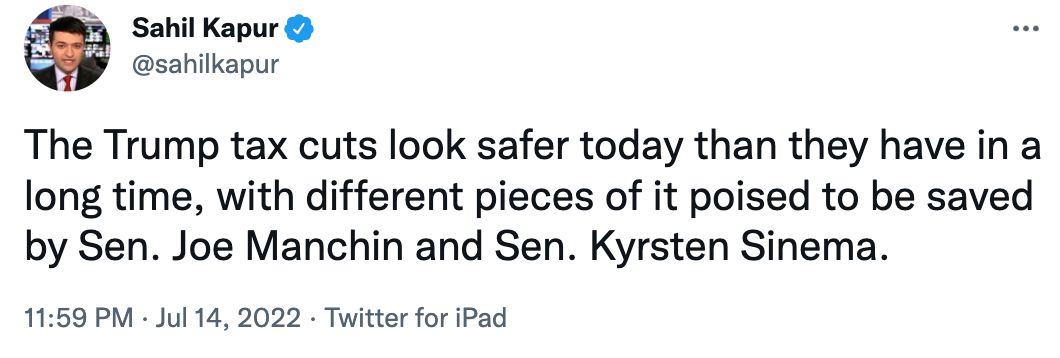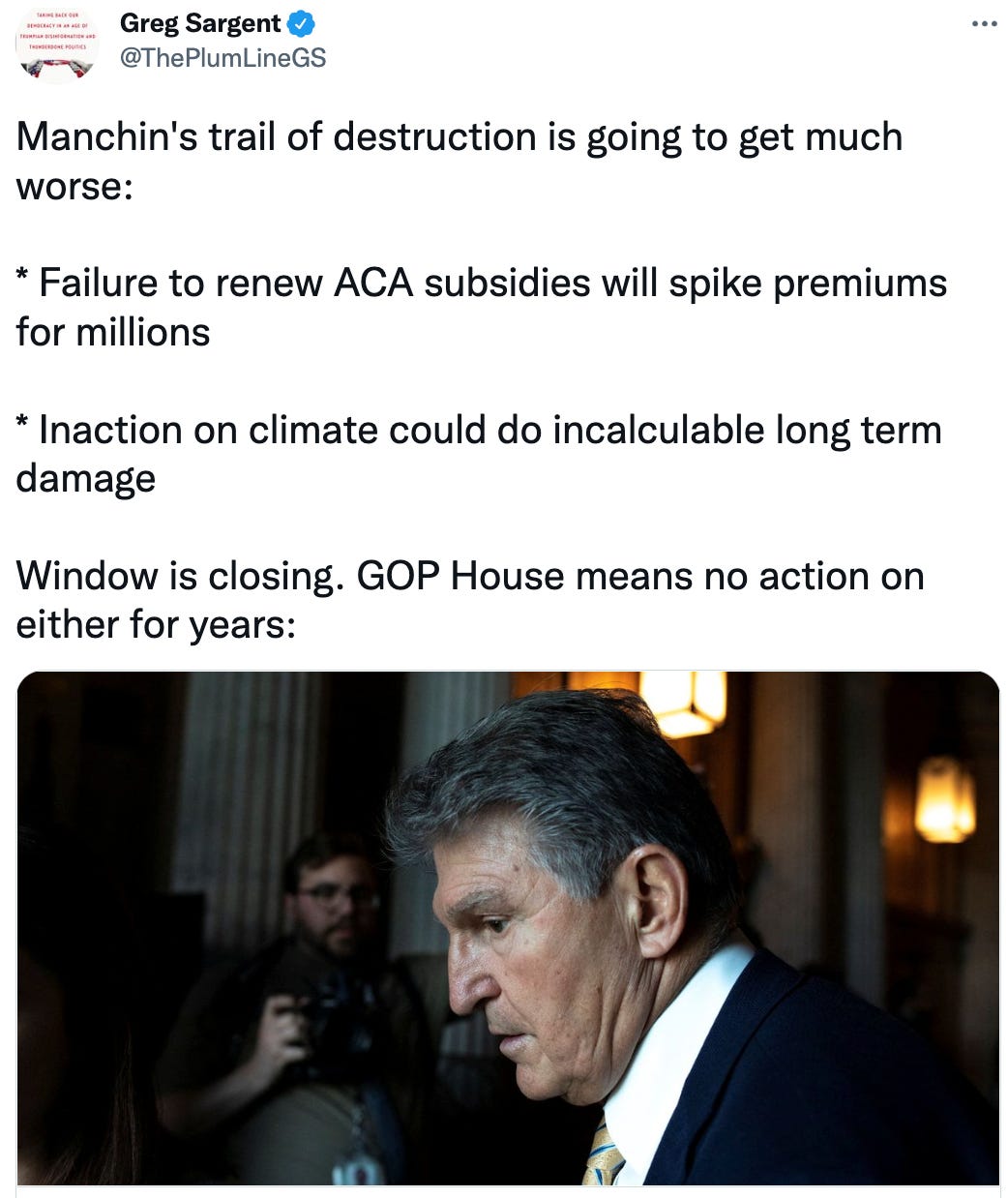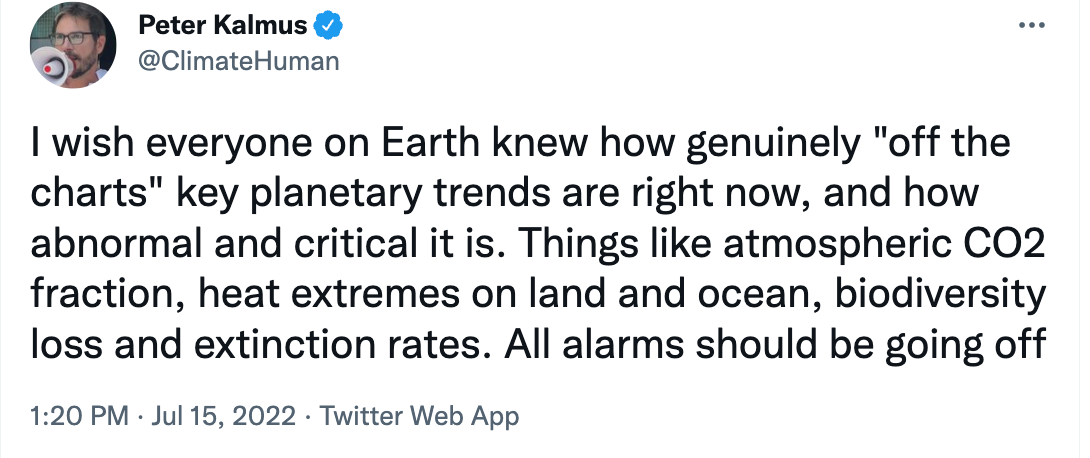The Pitchforks Aren't Coming
For the last two years, Joe Biden has been talking about raising taxes on large corporations and wealthy Americans. It's not happening.
Nearly a decade ago, tech entrepreneur Nick Hanauer warned his fellow billionaires that “the pitchforks are coming.” The economy was still reeling from the financial crisis, and for the vast majority of Americans the policy response had been a near total failure. There were too few jobs, too many foreclosures, and way too much inequality. Eventually, Hanauer wrote, the masses would rise up.
If we don’t do something to fix the glaring inequities in this economy, the pitchforks are going to come for us. No society can sustain this kind of rising inequality. In fact, there is no example in human history where wealth accumulated like this and the pitchforks didn’t eventually come out. You show me a highly unequal society, and I will show you a police state. Or an uprising. There are no counterexamples. None. It’s not if, it’s when.
Instead of fixing the glaring inequities, Republicans used their majorities to deliver huge tax cuts that overwhelmingly benefited people like Hanauer.
It was on the heels of the Trump tax cuts that billionaire hedge fund investor, Ray Dalio, started to worry that the pitchforks were coming. Capitalism, he argued, “was not working for the majority of Americans.” Unless policies were put in place to generate better economic outcomes—including a better distribution of wealth and income—a “revolution” was coming.
Around the same time, fellow billionaire Jamie Dimon wrote in his annual letter to shareholders that “far too many people were living on the edge.” He described a system in crisis and urged “a call to action.” Like Dalio, Dimon stressed the urgent need to build a more “inclusive economy.” Keeping the pitchforks at bay meant improving life—if only modestly—for those who might otherwise take to the streets.
Instead of taking to the streets, COVID kept many of us home. And while the pandemic caused immeasurable harm, the policy response was so much better that life did improve—at least financially—for millions of ordinary people.
The financial lifeline that started with the $2.2 trillion CARES Act in March 2020 culminated with the $1.9 trillion American Rescue Plan (ARP) Act in March 2021. The ARP was intended to put a punctuation mark on the economic recovery, not to permanently tackle the sort of inequities Hanauer described in his “memo to fellow zillionaires.”
To deal with the more structural problems, President Biden offered his Build Back Better agenda, explaining that “for too long, the economy has worked great for those at the top, while working families get squeezed.” No more tax breaks for billionaires. Instead, Biden wanted to tax them. In addition to a slew of other taxes, Biden proposed a “billionaire’s tax” on the top 0.0001, those with annual incomes over $100,000,000. The pitchforks were coming, and the rich were in the crosshairs.
It was time to rebuild the economy from “the bottom up and the middle out,” the president said in his State of Union address. To wring some of the inequality out of the system, he offered a plan that would have raised taxes on those at the top while investing trillions in child care, elder care, housing, education, climate, and more. For a while, Congress seemed poised to act on a $3.5 trillion package.
And then this happened.
Senator Manchin (D-WV) refused to vote for a package that wasn’t “fully paid for,” while Senator Sinema (D-AZ) refused to vote for the sweeping tax hikes that Biden insisted were necessary to “pay for” the spending. I wrote about the whole saga at length last year.
Anyway, the media teased us (again) last week, reporting that constructive negotiations with Senator Manchin were underway and democrats might yet pass portions of what was once part of the Build Back Better agenda. And then Lucy yanked the football once again.
As Washington Post columnist Greg Sargent reported on Friday:
This will surprise only people who haven’t paid even cursory attention to the last year of Democratic politics, but Sen. Joe Manchin III may have just killed any hopes for a resuscitated version of the Democratic agenda.
The West Virginia Democrat reportedly told party leaders late Thursday that he won’t support any new incentives to combat climate change or any new tax hikes on corporations or the wealthy.
So there you have it. The pitchforks aren’t coming. At least not the way some had expected. The top marginal tax rate isn’t going back up to 39.6 percent. We are not going to tax capital gains at the same rate as ordinary income. The corporate income tax rate isn’t going up. We’re not ending the step-up-in-basis or closing the carried-interest loophole. There will be no “billionaire’s tax.” None of it is happening.
President Obama once told a room full of bankers that his administration was “the only thing standing between [them] and the pitchforks.” Today, there’s a tendency to paint Senator Manchin as the lone obstacle. But for that single missing vote, action on climate, prescription drugs, and more would sail through Congress with higher taxes to “pay for” it all. I doubt it.
I think Jonathan Chait is probably right about this:
A key faction of Democrats in the House, along with Senator Kyrsten Sinema, blanched at the tax hikes. Moderates have been privately coordinating their opposition, and it seems very likely that Manchin’s sudden opposition to raising taxes on the rich comes not from him, but from them — he sometimes takes the heat for fellow Democratic moderates. In this case, he is likely channeling their concerns and passing them off as his own.
Whether it’s Manchin or Manchin & Co., it’s looking bad for millions of Americans, the future of the democratic party, our democracy, and life on earth.
There’s a lot we can’t predict in life. But one thing is for sure. Climate change is an accelerant on inequality. Within a few decades, billions of people will be forced to migrate due to extreme weather, rising sea levels, and damaged ecosystems. Fires will continue to ravage communities, rivers will swallow more homes, heat-related deaths will mount, and food shortages will lead to mass starvation. That is not a world in which the pitchforks can be kept at bay.
We need to act now!
Incidentally, Nick Hanauer co-hosts a podcast called Pitchfork Economics. I’ve been a guest several times. You might check it out.










Excellent, and necessary.
EQUALITY FOUNDATION !!
1-MEDICARE FOR ALL
2-GOVERNMENT GUARANTEED JOB PROGRAM